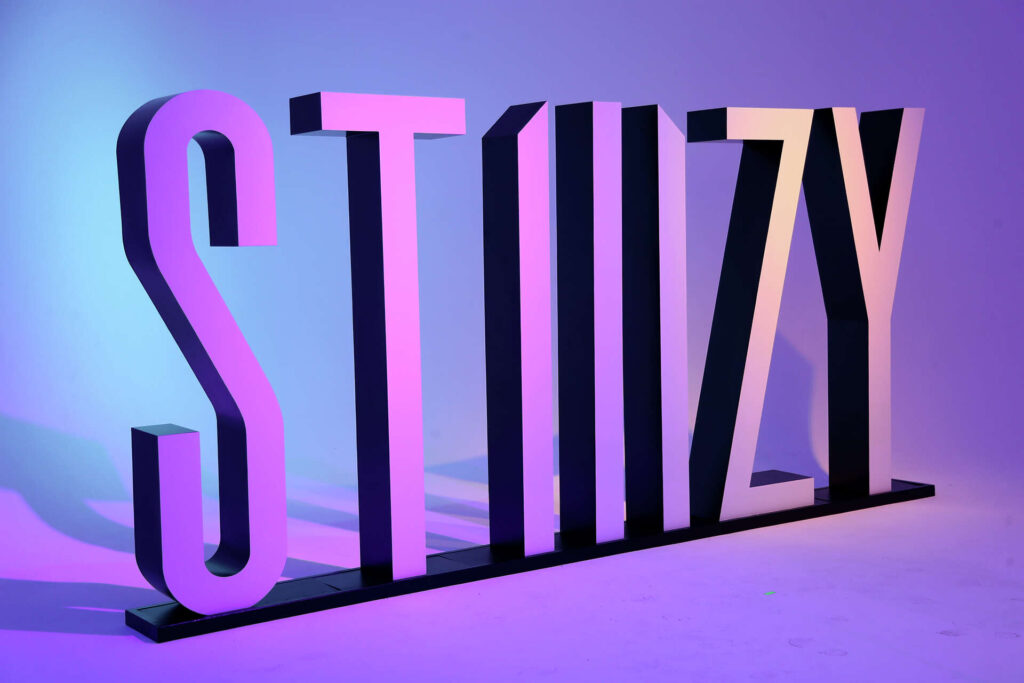Stiiizy is probably the most dominant name in California cannabis. It has the state’s largest chain of retail stores with 34 locations. Its house brand is a powerhouse in pot shops across the state. And it’s been the No. 1 cannabis vape company in California for the past 15 months, according to cannabis data firm Headset. The brand has become synonymous with the young, fashionable cannabis users who power a huge portion of sales in the marijuana industry.
But a legal storm has been brewing for years behind these rosy sales figures. Stiiizy has faced an onslaught of lawsuits and allegations attacking nearly every side of its business. It’s been accused of defrauding customers by overstating the THC content on its pre-rolled joints, of illegally selling cannabis across state lines to Illinois and Georgia, and of selling cannabis that contains a dangerous pesticide. The company has also been accused of running a vast operation to illegally divert cannabis into illegal cannabis stores across California.
Pristina Alford, a spokesperson for Stiiizy, said in an emailed statement to SFGATE that the company has been targeted primarily because it’s so successful.
“STIIIZY is one of the best-known companies in the industry. But that also makes us an easy target, in some people’s minds, for lawsuits. We are proud of our operation and that when the public thinks of cannabis, they think of us,” Alford said.
Attorneys SFGATE spoke with agreed that the company does attract more scrutiny because of its size but that the turbulence behind the powerhouse brand could also doom it.
Stiiizy dominates the industry

Stiiizy was founded in the Los Angeles area in 2017 by James Kim and Tony Huang just as California was transitioning from the unregulated medical cannabis market to the legal recreational industry. Kim told Forbes in 2019 that the brand’s name is a play on the word “steez,” a portmanteau of style and ease, and was designed to reflect the laid-back vibe of Southern California cannabis consumers.
Stiiizy quickly became a dominant force in every step of the supply chain, from growing its own cannabis to creating incredibly popular cannabis products and retail stores.
Stiiizy appeared to be one of the few legal California brands that could thrive in the recreational market. But over the past year, a darker picture emerged, with allegations connecting the company to California’s massive illicit market.
Allegations of illicit sales
By the end of 2023, Stiiizy was facing allegations of illegal sales from multiple sources. In December, the Los Angeles Times published an investigation that tied Huang to a vast operation to illegally sell cannabis, including owning nine different buildings that were used to conduct illegal sales. Lawyers who worked with Huang also represented individuals charged with selling cannabis at his buildings.
Separately, the Los Angeles City Attorney’s Office accused Huang and two other individuals of using a shell company to “hide their involvement and shirk responsibility tied to the illegal” cannabis sales at one Los Angeles property. Huang and his co-defendants were ordered to pay $1 million in civil penalties, according to an October news release from the city.
A lawsuit filed by Jon Avidor, a former CEO at Stiiizy’s parent company, further elaborated on these allegations, accusing the brand of running a “sprawling” criminal enterprise with 18 different illegal shops. Avidor has since voluntarily dismissed the lawsuit, and his attorneys did not respond to an SFGATE request for comment. Alford said in an email to SFGATE that the lawsuit was settled but declined to elaborate further, citing a confidential settlement.

According to the Times, a spokesperson for Huang denied in December that he knew of the illegal sales occurring at his properties, and Stiiizy sent the Times a cease-and-desist letter that threatened the company would sue the newspaper for defamation if it printed the story (a lawsuit doesn’t appear to have been filed).
Stiiizy has strongly denied these allegations. Alford, the spokesperson for Stiiizy, told SFGATE this week that Huang did not directly engage in the illegal sales, describing him as “a landlord to a tenant accused of operating an illicit dispensary,” and said he continues to work with the company despite the legal troubles.
“Mr. Huang was not accused of running the illegal store. As a co-founder of the company, Mr. Huang advises the company on certain matters periodically,” Alford said.
BEST OF SFGATE
Local | Meet the woman who has painted 400 of San Francisco’s Victorians
Obscure | The Bay Area’s very first bridge has been abandoned for 40 years
Culture | This obscure Bay Area experiment shaped the ending of ‘Star Wars’
Travel | This breakfast institution serves the best eggs Benedict in Tahoe
The web of allegations was controversial within California’s cannabis business community. Jerred Kiloh, the president of the United Cannabis Business Association, a trade group of 186 California pot retailers, said Stiiizy appeared to be attacking the foundations of the legal market.
“They’re playing both sides of the market, making money off the illicit one, and then they can lower their prices in the legal market because they’re supported by the illegal sales,” Kiloh alleged.
Kiloh said 67 of the association’s members have pulled Stiiizy’s products from their shelves in protest of the company, but he also said the allegations appeared to have little effect on the broader market.
“I haven’t seen a big dip in their revenue due to all of this. So it seems like they’ve stabilized,” Kiloh said.

So far, Stiiizy has avoided any serious public repercussions following these allegations, now that Avidor’s lawsuit has been dismissed and Huang fully paid the fine in Los Angeles. The California Department of Cannabis Control, which is charged with enforcing the state’s pot laws and could revoke Stiiizy’s licensing, has so far stayed silent and declined to comment on the matter in a request SFGATE sent this week.
Kiloh said his membership is angry that the DCC has refused to publicly confirm that it is actively investigating the serious allegations against the company.
“Ongoing investigations are something you can say out loud, and as a regulator … you might want to do that to deter bad behavior,” Kiloh said. “The DCC has failed miserably to regulate this industry in a public way to deter bad behavior.”
Class-action lawsuits
The allegations of illegal sales have gotten the most attention, but Stiiizy has also faced a range of other legal actions against its operations. It’s faced numerous class-action lawsuits from customers, including one that alleges the company overstated the THC content of its pre-rolled joints and another that alleges it illegally sold THC vape cartridges across the country.
In May, a Marin County teenager sued the company, saying that Stiiizy is “driving an epidemic” of cannabis-induced psychosis among California teenagers by directly marketing high-THC products to youth. The teenager says that he was diagnosed with psychosis after he started using Stiiizy products when he was 15. He is suing the company for negligence and fraud and is seeking unspecified damages.
Alford, the Stiiizy spokesperson, said in an emailed statement to SFGATE that the company denies the allegations in the Marin lawsuit.
“As sensitive as cannabis-induced psychosis (CIP) events are, the allegations in this lawsuit are false and inflammatory,” Alford said.

Justin Brandt, an Arizona attorney who has worked in the California cannabis industry, said that he has seen similar lawsuits facing other cannabis companies, and Stiiizy could be a target more for its size than the fact that it’s done anything wrong.
“Stiiizy is in a number of states in addition to dominating California, so anytime you’re a leader in the industry, you’re a bigger target, and people will try to take advantage of that,” Brandt told SFGATE. “I don’t know if I can say that these class-action suits against Stiiizy are any sort of indication of Stiiizy’s operations.”
He added that the individual class-action lawsuits are unlikely to fully wipe out a company like Stiiizy even if the plaintiffs ultimately win, because the damages can be small and limited to only small groups of customers. “I don’t know if it’s a fatal risk,” Brandt said.
Stiiizy told SFGATE this week that it stopped manufacturing and distributing hemp vapes earlier this year, which was a source of multiple lawsuits against the company.
A Stiiizy future?

Stiiizy appears to have the pieces to build one of the biggest cannabis brands in America. The company is in a commanding lead in California, a massive and competitive market that’s incredibly difficult to succeed in, and it’s not hard to imagine Stiiizy becoming as synonymous with cannabis vaping as Kleenex is with tissue paper.
But the brand’s early success does not ensure its future dominance, according to Laura Bianchi, a legal partner of Brandt who focuses on cannabis matters. She said the types of issues Stiiizy is facing with lawsuits and management fights have doomed other California pot companies.
“A lot of big names that started in California everyone thought were going to be huge and paved the way to be the biggest in the industry and … a lot of them have crumbled,” Bianchi said. “… I still think you’re going to see quite a few who may trip themselves up and not be here in five years or 10 years.”
H/T: www.sfgate.com



